
The Roman World of Cicero's De Oratore
Seiten
2006
Oxford University Press (Verlag)
978-0-19-920773-2 (ISBN)
Oxford University Press (Verlag)
978-0-19-920773-2 (ISBN)
A wide introduction to Cicero's political and cultural world, illustrating, by its analysis of his imaginary dialogue between statesmen, how he introduced the principles of Greek philosophy and rhetoric into Roman education, so that his work became the basis of humanist ideals in the Renaissance and Enlightenment.
The Roman World of Cicero's De Oratore aims to provide an accessible study of Cicero's first and fullest dialogue, on the ideal orator-statesman. It illustrates the dialogue's achievement as a reflection of a civilized way of life and a brilliantly constructed literary unity, and considers the contribution made by Cicero's recommendations to the development of rhetoric and higher education at Rome. Because Cicero deliberately set his extended conversation in the generation of his childhood teachers, a study of the dialogue in its historical setting can show how the political and cultural life of this earlier period differed from Cicero's personal experience of the collapse of senatorial government, when the overwhelming power of the `first triumvirate' forced him into political silence in the last decade of the republic. After an introductory chapter reviewing Cicero's position on return from exile, chapters include a comparative study of the careers of M. Antonius and L. Licinius Crassus, protagonists of the dialogue, a discussion of Cicero's response to Plato's criticisms of rhetoric in the Gorgias and Phaedrus, and his debt to Aristotle's Rhetoric, analysis of the dialogue's treatment of Roman civil law, existing Latin literature and historical writing, Strabo's survey of the sources and application of humour, political eloquence in senate and contio, theories of diction and style, and the techniques of oral delivery. An epilogue looks briefly at Cicero's De re publica and Tacitus' Dialogus de oratoribus as reflections on the transformation of oratory and free (if oligarchic) republican government by debate to meet the context of the new autocracy.
The Roman World of Cicero's De Oratore aims to provide an accessible study of Cicero's first and fullest dialogue, on the ideal orator-statesman. It illustrates the dialogue's achievement as a reflection of a civilized way of life and a brilliantly constructed literary unity, and considers the contribution made by Cicero's recommendations to the development of rhetoric and higher education at Rome. Because Cicero deliberately set his extended conversation in the generation of his childhood teachers, a study of the dialogue in its historical setting can show how the political and cultural life of this earlier period differed from Cicero's personal experience of the collapse of senatorial government, when the overwhelming power of the `first triumvirate' forced him into political silence in the last decade of the republic. After an introductory chapter reviewing Cicero's position on return from exile, chapters include a comparative study of the careers of M. Antonius and L. Licinius Crassus, protagonists of the dialogue, a discussion of Cicero's response to Plato's criticisms of rhetoric in the Gorgias and Phaedrus, and his debt to Aristotle's Rhetoric, analysis of the dialogue's treatment of Roman civil law, existing Latin literature and historical writing, Strabo's survey of the sources and application of humour, political eloquence in senate and contio, theories of diction and style, and the techniques of oral delivery. An epilogue looks briefly at Cicero's De re publica and Tacitus' Dialogus de oratoribus as reflections on the transformation of oratory and free (if oligarchic) republican government by debate to meet the context of the new autocracy.
Elaine Fantham is Giger Professor of Latin Emerita, Princeton University.
1. Cicero at Fifty ; 2. The Public Careers of L. Licinius Crassus and M. Antonius ; 3. Constructing the Dialogue: The Challenge of Plato ; 4. The Future Orator: Talent, Training, and the Choice of Model ; 5. The Orator and the Law ; 6. Oratory and Literature: The Spoken and the Written Word ; 7. Rediscovering Aristotelian Invention ; 8. Wit and Humour as the Orator's Combat Weapons ; 9. Political Persuasion: Senate and Contio ; 10. Style and Substance ; 11. Res Pervolgatae: Words and their Manipulation in Standard Rhetorical Theory ; 12. Into Action: The Orator as Public Figure ; 13. Epilogue: The Statesman and the State in De Oratore and After
| Erscheint lt. Verlag | 7.12.2006 |
|---|---|
| Verlagsort | Oxford |
| Sprache | englisch |
| Maße | 130 x 210 mm |
| Gewicht | 464 g |
| Themenwelt | Geschichte ► Allgemeine Geschichte ► Vor- und Frühgeschichte |
| Geisteswissenschaften ► Geschichte ► Regional- / Ländergeschichte | |
| Geisteswissenschaften ► Sprach- / Literaturwissenschaft ► Anglistik / Amerikanistik | |
| Geisteswissenschaften ► Sprach- / Literaturwissenschaft ► Latein / Altgriechisch | |
| Geisteswissenschaften ► Sprach- / Literaturwissenschaft ► Literaturwissenschaft | |
| Geisteswissenschaften ► Sprach- / Literaturwissenschaft ► Sprachwissenschaft | |
| ISBN-10 | 0-19-920773-9 / 0199207739 |
| ISBN-13 | 978-0-19-920773-2 / 9780199207732 |
| Zustand | Neuware |
| Haben Sie eine Frage zum Produkt? |
Mehr entdecken
aus dem Bereich
aus dem Bereich
auf den Spuren der frühen Zivilisationen
Buch | Hardcover (2023)
C.H.Beck (Verlag)
CHF 27,95
Konzepte – Methoden – Theorien
Buch | Softcover (2024)
UTB (Verlag)
CHF 55,85
Was Pompeji über uns erzählt
Buch | Hardcover (2023)
Propyläen (Verlag)
CHF 44,75


